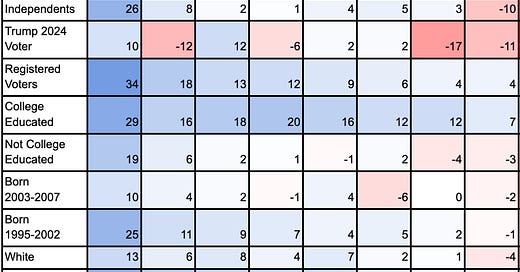The latest Young Men Research Project (YMRP) poll, fielded by YouGov from May 14 to May 29, asks 18-29-year-old men about their favorability toward a range of Democratic and Republican politicians. Below is a table showing just the Democratic politicians, broken down for different subgroups of young men.
At a high level, young men are most supportive of Bernie Sanders (+22 net support), Alexandra Ocasio-Cortez (+9), Wes Moore (+8), and Pete Buttigieg (+5). As a note, the YouGov sample was weighted to match Catalist’s turnout targets, reflecting a Trump +5 electorate: 34 percent said they voted for Trump, 29 percent for Harris, 1 percent for a third party, and 36 percent did not vote.
The poll includes prominent Democrats like Sanders, Harris, Joe Biden, Chuck Schumer, AOC, Moore, Buttigieg, Josh Shapiro, JB Pritzker, Gretchen Whitmer, and Gavin Newsom. A number of possible candidates were not included (ex., Ro Khanna, Andy Beshear, Rahm Emmanuel, Chris Murphy) due to time constraints. For this analysis, we will largely focus on the group most commonly referred to as contenders: AOC, Moore, Buttigieg, Shapiro, Pritzker, and Newsom (again, there could easily be others).
These VERY early numbers partially reflect how well-known these figures are with young men. For example, Bernie Sanders is simply more of a household name than most other Democrats in this group- only 18% of young men have no opinion of him. Sanders, who will be 87 by the 2028 presidential election, will likely not run (but who knows). While historically reluctant to endorse candidates, the Vermont senator has been going around the country doing big events with AOC. Kamala Harris is also very well-known and remains highly favorable among Democrats, but is reportedly eyeing a run for California Governor. The table below shows the percentage of 18-29-year-old men who had an opinion, positive or negative, of the politician. Higher numbers indicate candidates who are better known.
AOC is very popular with young Democratic men, slightly popular with independents, and deeply unpopular with young Republican men. Her +46 margin among Democrats is the highest of any potential 2028 contender (again, excluding Harris and Sanders). Among Republicans, she sits at -20–the lowest overall approval in our selected group. Her +8 rating with independents roughly matches her overall standing and, like Bernie’s high approval with this group, contradicts the notion that independents are ideologically moderate. Two in five young men overall, and half of Hispanic respondents, say they’re still unsure or have no opinion of her. Still, she has the highest name ID of any likely 2028 contender.
Though he’s denied interest in running, many on the left see Wes Moore as a rising star, and his recent visits around the country have fueled speculation. He holds a net +8 approval and, notably, the same overall approval among Republicans. But among Democrats, his +19 rating lags behind AOC, Buttigieg, and Newsom. Despite the buzz, Moore remains relatively unknown nationally–just 39% of respondents expressed an opinion on Maryland’s governor, the lowest rate among those polled.
Gavin Newsom has the lowest overall support of any Democratic contender, at -1. His strong reputation among Democrats (+27) is undermined by high unpopularity among Republicans (-17) and independents (-10). In fact, he is the only Democratic contender with net negative support among independents. His approval jumps among Black registered voters (RVs) to +19, but dips significantly among Hispanic respondents (-6). Despite his rising national profile, Newsom remains relatively unknown nationally among young men, with just 58% of respondents expressing any opinion about him.
Josh Shapiro, JB Pritzker, and Gretchen Whitmer all register modest net positive ratings (+4, +3, +1), but each struggles with major name recognition problems, with 51-57% unsure or unfamiliar with these governors. Among Democrats, Whitmer has +17 approval, followed by Pritzker (+11) and Shapiro (+7). But among Republican-identifying young men, the trend reverses: Shapiro is +6, Pritzker is -2, and Whitmer drops to -13.
Pete Buttigieg, the former presidential candidate and Transportation Secretary, performs relatively well among Democrats with a +34 rating, just behind AOC. College-educated respondents are one of his strongest groups (+20), yet he is thirteen points underwater with Republicans. Of note, his +16 favorability among Black men respondents in this poll is markedly different from Emerson College’s recent poll, which placed his Black voter support at 0%.
Half of all respondents and 37 percent of Democrats say they’re unsure or have no opinion on Buttigieg. His lack of name recognition among young men is perhaps surprising, but may explain his recent media tour. Buttigieg has ramped up his media appearances to reach younger, less politically engaged voters. Ahead of the 2024 election, he appeared on Jubilee’s YouTube channel and, more recently, was a guest on Andrew Schulz’s Flagrant with Akaash Singh, Smartless, and Philip DeFranco.
—
Overall, it’s still too early to say whether the strategy among some Democrats of going on podcasts and YouTube shows is paying dividends.
Among voters who consume podcasts for news, the impact on candidate favorability is unclear. Shapiro sees the largest boost at +6 compared to non-podcast news consumers, while AOC and Newsom post modest gains of +1 and +2, respectively. However, Buttigieg (arguably the most present on podcasts) faces the steepest decline at -10, followed by Whitmer at -9, Moore at -4, and Pritzker at -2.
Buttigieg sees marginal improvement among voters who get their news on YouTube compared to those who don’t (+2). Shapiro still sees a two-point bump, while Wes Moore drops even lower at -6. For most others, the effects are negligible. These findings reinforce that “getting on the platform” isn’t enough, as we’ve suggested in other pieces, but should still be part of any candidate’s overall strategy for reaching young men.
A sharp age divide emerged, both in terms of name ID and support. Younger men surveyed (age 18-22) had less knowledge of the elected officials and are more conservative-leaning than older young men (age 23-29). This is an unsurprising finding, given that they are recently of voting age and, according to recent analyses, are trending more Republican. Some of the starkest gaps are for AOC (55% unsure/no opinion vs 36%) and Whitmer (68% vs 50%). Among the younger group, favorability drops nearly across the board: AOC falls from +11 to +4; Buttigieg from +7 to -1; Moore from +9 to +2; Pritzker from +5 to -6; and Whitmer from +2 to neutral. Newsom and Shapiro see virtually no shifts.
Hispanic respondents are highly favorable toward AOC (+20), but the numbers tail off from here: Pritzker (+3), Buttigieg (+2), Moore (–2), Shapiro (–7), Whitmer (–2), and Newsom (–6).
White respondents showed lower overall support compared to Black and Hispanic young men. Among the selected candidates, Wes Moore and Josh Shapiro perform best at +8 and +7, respectively, while most other Democratic contenders show modest single-digit approval ratings. Newsom is once again the exception, posting a -4 rating.
—
2028 is a long way off.
Many young men are simply unfamiliar with these candidates or are still sorting out their opinions. And it’s no guarantee that more recognition equals higher approval. Hillary Clinton’s approval tanked from the start of the Democratic primary process to election day 2016. Harris also saw a dip from the time Biden dropped out to November 2024. It’s also not clear (yet) how different young men are from other segments of the population- the relative popularity of each politician in this poll is similar to rankings from other general population surveys (although name-recognition is MUCH lower among young men). If anything, young men may have more room to change and increase/decrease support because they have low awareness of the various potential candidates.
But what’s clear is that those gunning for the top of the ticket are already making moves to get their name out there. From AOC’s “Fighting Oligarchy” tour to Buttigieg’s national road trip and podcast blitz to Newsom’s recent pit stop in South Carolina, the road to the nomination is well underway.
We will continue to track the candidates and how their standing changes among young men.








As always, concerned about young men voting Democrats, not really about young men.
Why not be concerned about young men voting Republicans? Because you claim to be "non-partisian" but you are not.